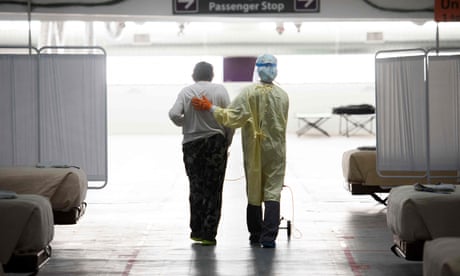- by foxnews
- 12 Mar 2025
Millions risk losing US healthcare when Covid emergency declaration expires
Millions risk losing US healthcare when Covid emergency declaration expires
- by theguardian
- 27 May 2022
- in news

According to an analysis by the Kaiser Family Foundation, an estimated 5.3 million to 14.2 million could lose their Medicaid coverage when the Covid-19 public health emergency ends on 15 July if it is not extended.
The analysts cited the wide range due to uncertainty on how states will respond to the end of continuous enrollment and how many people will lose coverage as a result. Medicaid enrollment is estimated to reach 110.2 million people by the end of fiscal year 2022, with enrollment expected to decline significantly when continuous enrollment ends.
Dylan Brown of New Jersey is disabled and relies on Medicaid for a home aide he requires around the clock to be able to get out of bed, dress and feed himself. He constantly worries about losing his Medicaid and Social Security disability insurance due to income and asset eligibility requirements and is very concerned about losing Medicaid when continuous enrollment ends.
During the pandemic, the federal government required states to continuously enroll Medicaid recipients into the program, providing $100.4 bn in new funds to cover the costs of doing so, halting coverage gaps and loss of eligibility for those who rely on healthcare coverage through Medicaid.
The current pandemic health emergency declaration is set to expire in mid-July. It is expected to be extended again, but an extension date has yet to be set by the US Department of Health and Human Services.
Roberts said policymakers need to address these problems, as Medicaid determination and redetermination is complex already. Those complexities are magnified when states have to start conducting those determinations on such a large scale without the proper administrative and navigational assistance and resources in place.
Zachary Fusfeld of Philadelphia, Pennsylvania, a PhD candidate in epidemiology at Drexel University, is anticipating the loss of his Medicaid coverage when continuous enrollment ends, because his university stipend increase will put him over the income limit.
A type one diabetic who suffers from other illnesses, Fusfeld said he will have to rely on his student healthcare and pay out of pocket for copays on medications, medical supplies, and doctor visits when his Medicaid coverage ends later this year, the costs of which are not affordable and not covered by his pay increase.
- by foxnews
- descember 09, 2016
Daring airport trend has travelers arriving at gate 15 minutes before takeoff
Flight passengers are participating in the new viral trend, "airport theory," with flyers arriving at their gates 15 minutes before their flights depart. A travel expert weighs in.
read more


